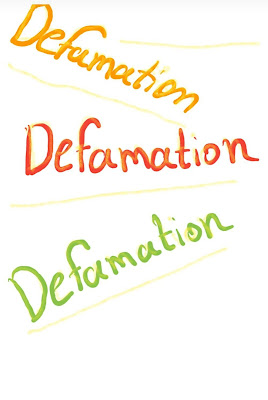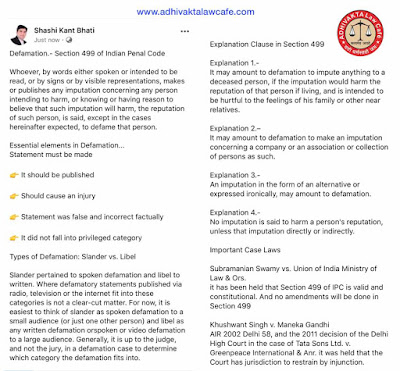*Defamation.- Section 499 of Indian Penal Code*
Whoever, by words either spoken or intended to be read, or by signs or by visible representations, makes or publishes any imputation concerning any person intending to harm, or knowing or having reason to believe that such imputation will harm, the reputation of such person, is said, except in the cases hereinafter expected, to defame that person.
*Essential elements in Defamation…*
*Statement must be made*
👉 It should be published
👉 Should cause an injury
👉 Statement was false and incorrect factually
👉 It did not fall into privileged category
*Types of Defamation: Slander vs. Libel*
Slander pertained to spoken defamation and libel to written. Where defamatory statements published via radio, television or the internet fit into these categories is not a clear-cut matter. For now, it is easiest to think of slander as spoken defamation to a small audience (or just one other person) and libel as any written defamation orspoken or video defamation to a large audience. Generally, it is up to the judge, and not the jury, in a defamation case to determine which category the defamation fits into.
*Explanation Clause in Section 499*
*Explanation 1.-*
It may amount to defamation to impute anything to a deceased person, if the imputation would harm the reputation of that person if living, and is intended to be hurtful to the feelings of his family or other near relatives.
*Explanation 2.–*
It may amount to defamation to make an imputation concerning a company or an association or collection of persons as such.
*Explanation 3.-*
An imputation in the form of an alternative or expressed ironically, may amount to defamation.
*Explanation 4.-*
No imputation is said to harm a person’s reputation, unless that imputation directly or indirectly.
*Important Case Laws*
*Subramanian Swamy vs. Union of India Ministry of Law & Ors.*
it has been held that Section 499 of IPC is valid and constitutional. And no amendments will be done in Section 499
*Khushwant Singh v. Maneka Gandhi*
AIR 2002 Delhi 58, and the 2011 decision of the Delhi High Court in the case of *Tata Sons Ltd. v. Greenpeace International & Anr.*
it was held that the Court has jurisdiction to restrain by injunction.
*Shashi Kant Bhati*
Advocate, Ghaziabad

